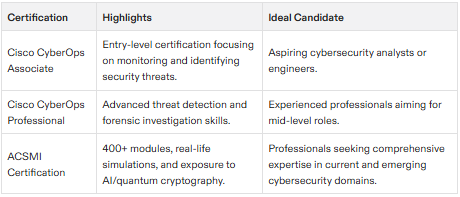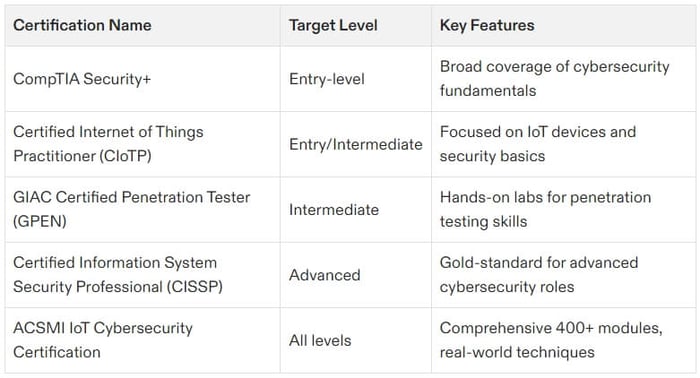Table of Contents
- What is the Cisco Cybersecurity Certification?
- Cisco Cybersecurity Certification Cost Breakdown
- Is the Cisco Cybersecurity Certification Worth the Cost?
- Pairing Cisco Certifications with ACSMI for Long-Term Success
- Certification Comparison Table
- FAQs About Cisco Cybersecurity Certification Cost
- Final Thoughts
The cybersecurity industry is booming, driven by the rising threats of cyberattacks and the massive investments organizations are making to protect their digital assets. For professionals, this growth translates into endless opportunities, but only if they have the right qualifications. Certifications serve as vital stepping stones into the field, offering proof of expertise and opening doors to high-demand roles. Among the most sought-after are Cisco cybersecurity certifications, celebrated worldwide for their credibility and depth. But as you plan your pathway to success, one key question arises—what is the Cisco cybersecurity certification cost, and is it truly worth the investment? Whether you're eager to kick-start your career or level up your skills, understanding the financial commitment alongside the career benefits of Cisco certifications is essential.
What is the Cisco Cybersecurity Certification?
Cisco offers globally recognized certifications that validate your skills in protecting networks, responding to security threats, and maintaining secure systems. Here are three popular Cisco certifications that aspirants should consider:
- Cisco Certified CyberOps Associate: Designed for those starting a career in cybersecurity, focusing on entry-level security operations.
- Cisco Certified CyberOps Professional: Catering to mid-level professionals, this credential covers advanced threat detection, prevention, and forensic techniques.
- Cisco Certified Network Professional Security (CCNP Security): Aimed at experienced individuals, specializing in designing and implementing secure networks.
Being Cisco-certified not only demonstrates technical proficiency but also opens doors to high-paying roles like Network Security Analyst and Security Operations Engineer.
Cisco Cybersecurity Certification Cost Breakdown
The Cisco cybersecurity certification cost varies depending on the certification level and the exams you need to pass. Below are approximate costs for popular programs:
CyberOps Associate Certification:
- Exam cost: $300
- Self-paced training (optional): $800 - $1,000
- Total estimated cost: $300 (minimum) to $1,300
CyberOps Professional Certification:
- Exam cost (Core Exam): $400
- Exam cost (Concentration Exam): $300
- Recommended training bundles (optional): $1,500+
- Total estimated cost: $700 (minimum) to $2,200+
CCNP Security Certification:
- Exam cost (Core Exam): $400
- Exam cost (Specialization Exam): $300
- Official Cisco training programs (optional): $2,000+
- Total estimated cost: $700 (minimum) to $3,000+
Remember, these are only the direct costs. Factor in additional expenses like preparation materials, time commitment, and re-exam fees to get a clearer picture of total learning costs.
Is the Cisco Cybersecurity Certification Worth the Cost?
If you're committed to growing your career in cybersecurity, Cisco certifications offer value far beyond their price tags. Here’s why they are worth the cost:
- Global Recognition: Cisco boasts unmatched brand value, making their certifications highly respected within the industry.
- Lucrative Job Opportunities: Certified professionals often command higher salaries. For example, CyberOps-certified individuals earn an average annual salary of $80,000 - $100,000.
- Comprehensive Coverage: These certifications go beyond theory, teaching candidates to design, implement, and troubleshoot security systems effectively.
However, the Cisco cybersecurity certification cost might seem steep if you're on a tight budget. To make the most of it, ensure you complete ample preparation through supplementary advanced learning programs, like ACSMI certification, to give your career an additional boost.
Pairing Cisco Certifications with ACSMI for Long-Term Success
Cisco certifications are an excellent starting point for building foundational and intermediate skills in cybersecurity. However, to truly excel and prepare for advanced roles, combining Cisco certifications with ACSMI certification can take your expertise to the next level.
Why Pair Cisco Certifications with ACSMI?
While Cisco certifications focus on developing strong theoretical knowledge and network security fundamentals, ACSMI complements this with rigorous, hands-on training and exposure to cutting-edge technologies. Here’s how ACSMI adds tremendous value to your learning pathway:
- 400+ Hands-On Labs: Immerse yourself in practical, task-oriented exercises designed to address real-world cybersecurity challenges. These labs hone your ability to identify, analyze, and mitigate threats under real-world conditions.
- AI and Quantum Cryptography Modules: Gain expertise in advanced technologies, such as artificial intelligence and quantum cryptography, which are becoming essential for safeguarding next-generation systems. Learning these topics ensures that you're fully equipped to tackle emerging challenges in cybersecurity.
- Industry-Relevant Training Tools: ACSMI programs provide training on modern tools and technologies widely used in enterprise cybersecurity operations, making you job-ready from the start.
The Perfect Blend for Career Growth
Where Cisco certifications validate your skills in topics like threat detection and secure network design, ACSMI ensures you can apply those skills with confidence in high-pressure environments. This unique combination of theoretical credentials and extensive practical experience gives you a well-rounded edge in the competitive cybersecurity field.
Certification Comparison Table
FAQs About Cisco Cybersecurity Certification Cost
1. How Much Does the Cisco Cybersecurity Certification Cost?
The Cisco cybersecurity certification cost ranges between $300 and $3,000, depending on the certification level and optional training materials.
2. Can Cisco Cybersecurity Certifications Help Me Get a Job?
Absolutely. Cisco-certified professionals are in high demand across industries due to their validated technical proficiency. Entry-level certifications prepare you for roles such as Security Analyst, while advanced certifications open doors to high-paying positions like Network Security Engineer.
3. Do I Need Training to Pass Cisco Cybersecurity Exams?
Although optional, training is highly recommended, as Cisco exams are challenging and require strong conceptual understanding. You can either use Cisco’s official training or combine it with comprehensive programs like ACSMI certification for better results.
4. How Long Does It Take to Get Cisco Certified?
The timeline depends on your chosen certification and the time dedicated to preparation. On average, it takes 3-6 months for associate certifications and up to 12 months for professional-level programs.
5. Are There Any Alternatives to Cisco Certifications?
Yes, alternatives include CompTIA Security+, CEH (Certified Ethical Hacker), and ACSMI certifications. Each specializes in different areas of cybersecurity, so your choice depends on career goals.
Final Thoughts
Understanding the Cisco cybersecurity certification cost is crucial before deciding on your cybersecurity career path. While these certifications may require a significant financial investment, the credentials they offer can lead to substantial returns in terms of career opportunities and salaries.
Pairing Cisco certifications with advanced learning tools like ACSMI certification is the ultimate strategy for career growth. With hands-on labs and modules focused on emerging tech, ACSMI complements Cisco’s theoretical and applied training, ensuring you are well-prepared for the evolving demands of the cybersecurity industry.
The cybersecurity landscape is constantly evolving. By strategically investing in certifications that blend foundational knowledge with practical expertise, you can secure your future in this high-growth field. Start today and watch your career soar!





